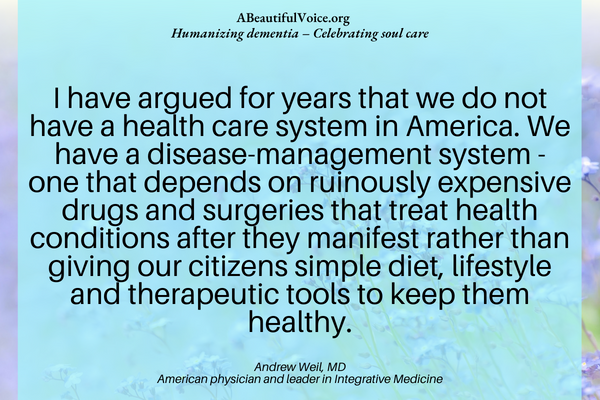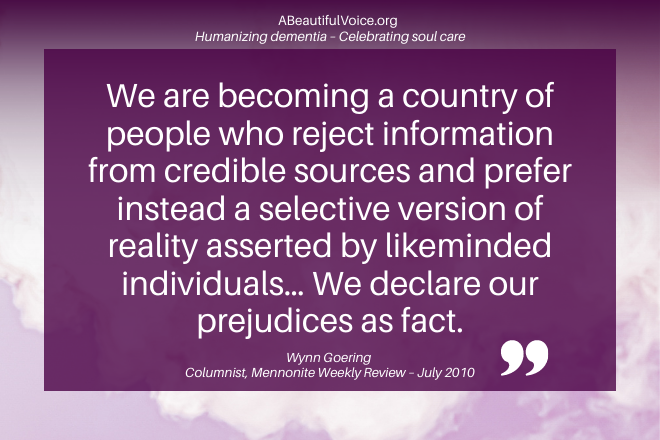Introduction
Welcome to ABeautifulVoice.org, where today we’re diving into a thought-provoking topic raised in part 1 of our article: “Reparations for harm to people living with dementia in residential aged care.” As we explore this issue, we’ll be taking a closer look at Australia, the home country of the authors who presented their research as a case study. In this article, Part II, we’ll be discussing dementia care in America, and why it is the way it is. You may be wondering, why look at Australia when it seems so far removed from the healthcare landscape in America? That’s a great question, read on to find out!
Improving dementia care in the USA
Is providing the best possible healthcare a priority in the US? One way this occurs is through the teaching and spreading of techniques and breakthroughs from different cultures and nations around the world, so why should dementia care be different? By looking into discussions from around the world, in particular those from countries that excel, we can learn and further our own dementia care.
In my experience, there is a problem with this area of thought in the US, as many Americans view the US as the pinnacle of healthcare worldwide. But is it an accurate depiction of American healthcare?

We’ll dive into this further in our article, but to summarize it, no. Some aspects of American healthcare are exceptional, and the talent available may very well be the pinnacle. However, US dementia care does not share in this esteem. Let’s discuss why.
Health is a human right, right?
In the world of healthcare, especially in the US, we often prioritize disease management and health insurance over preventing illnesses and promoting healthy lifestyles. This reliance on big pharma and a medical community focused on treating symptoms can hinder our overall well-being.
Quyen Nguyen, an American Surgeon and Professor at UC San Diego, has shed light on this prevailing myth in our culture and helped draw attention to it.

This mindset in tandem with our inherent belief that we are the pinnacle unfortunately leads to new information being dismissed. Studies that contradict our preconceived notions are often dismissed even though they are credible sources. This narrow-minded approach prevents us from recognizing that other countries may have a better quality of life – thanks to their emphasis on prevention and overall health.
For a very long time – beginning during my employment in healthcare – I have referred to our healthcare system as “the business of healthcare.” It is a profit-driven industry that often comes at the expense of the consumer – you, me, our families, and our future generations. We bear the burden of poor health outcomes and a diminished sense of well-being. And I for one, would love to see this changed.
As an advocate for elders with dementia, I have witnessed firsthand a system that fails to protect the most vulnerable among us. Instead, it perpetuates sickness and neglect.
Our prejudices have become firmly rooted
I want to take a moment to step back from our preconceived notions of healthcare, and truly think about the system we could have. A system that doesn’t ignore information and studies from around the world, but instead, integrates it.

It’s natural for new research findings to face scrutiny and criticism before real change can happen. But if we don’t embrace new ideas and shifts in perspective, our society will continue to fall behind.
To improve the care and well-being of those with dementia, we must look to other countries for inspiration. They can serve as models for not only effective dementia care, but healthcare as a whole.
A diagnosis of dementia has a profound impact on one’s life. From day one, we need to draw upon all support systems required to prevent neglect and abuse – and nurture growth. In addition, we need to assist the person living with dementia to work with significant others to create a life plan – a plan for continuing to live one’s best life!
It may seem daunting, but I believe that we can make a difference in dementia care in the US. By following the footsteps of countries like Australia and putting aside our prejudices, we must call for systemic changes which benefit people living with dementia and their families.
Final thoughts and where we go from here
In the next article, Part III of our discussion, we’ll delve deeper into the specifics of the Australian system, identifying and examining the elements that make it successful. This exploration will not only highlight the potential for improvement in our own methods, but will also provide a tangible blueprint to guide our steps in creating a more compassionate and effective culture surrounding dementia.
____________
If you are awakening to the idea of “reparations” for people living with dementia, please review the supplemental format titled EASY READ REPORT – which is presented with PICTURES and BIG PRINT:
To access the Final Report:
Blog post co-authors: This review was co-authored by Susan Troyer and Kia Marie @Fiverr.com where she is a full-time writer. Previously, she worked as a dementia nurse and graduated in the top 3% in Australia.


Leave A Comment